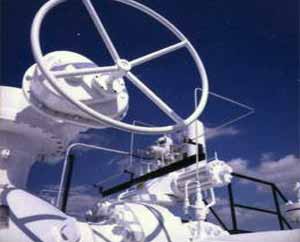February 22, 2008 (the date of publication in Russian)
Sergey Pravosudov
WEARINESS WITH PERMANENT BARGAIN
Moscow urges Ukraine and Central Asia states to strike long-term gas deals
 Until recent time, natural gas was delivered to Ukraine by Rosukrenergo, a joint-stock venture co-owned by Gazprom, Raiffeisen-Invest, and two Ukrainian individuals. During a round of talks in Moscow, Presidents Vladimir Putin and Victor Yushchenko weighed up to change the scheme, entrusting mediating functions to a company co-owned by Gazprom and Naftogaz-Ukraine.
Until recent time, natural gas was delivered to Ukraine by Rosukrenergo, a joint-stock venture co-owned by Gazprom, Raiffeisen-Invest, and two Ukrainian individuals. During a round of talks in Moscow, Presidents Vladimir Putin and Victor Yushchenko weighed up to change the scheme, entrusting mediating functions to a company co-owned by Gazprom and Naftogaz-Ukraine.
The scheme, involving Rosukrenergo, had been in force since January 2006, when Kiev tried to prevent increase of prices for imported gas, determined with the international price hike for fuel. After many rounds of talks, Naftogaz-Ukraine agreed to purchase gas for a higher price. In order to mitigate the impact on Ukrainian economy, Ukraine preferred to purchase gas from Rosukrenergo, which possessed relatively cheap gas extracted in Central Asia, along with more expensive Russian gas. In its turn, Rosukrnergo could capitalize from the possibility to independently export certain amounts of gas to Europe. Later, Rosukrenergo also entered Ukraine's domestic market, co-establishing a joint company with Naftogaz-Ukraine, named Ukrgazenergo.
However, due to unusually cold weather in December 2007-January 2008 in Central Asia, Turkmenistan reduced the amount of sales to Rosukrenergo, having to deliver more fuel to domestic consumers. Therefore, Rosukrenergo had to deliver a larger share of more expensive Russian gas to Ukraine. The ensuing increase of Ukraine's liabilities was the subject of present bilateral talks in Moscow. The sides signed an agreement for year 2008, setting the price for Turkmenian gas on the level of $179.5, and for Russian gas on the level of $300 per 1000 cub m.
At the same time, the two heads of states agreed to establish a new joint venture, in which Gazprom and Naftogaz will have equal shares (thus, Gazprom's share will increase to 50%).
The bilateral debates on gas prices arouse anxiety in those European countries, which receive major amounts of gas from Russia via Ukraine. In January 2006, the Ukrainian side illegally abducted certain amount of gas, thus creating deficit of import to European consumers.
In order to reduce dependence from Ukrainian transit, Gazprom initiated construction of new export pipelines. In addition to the functioning Yamal-Europe pipeline via Belarus and Poland, and Blue Stream that connects Russia and Turkey across the Black Sea, Gazprom is going to build a new trans-Baltic Nord Stream pipeline, as well as a new pipeline connecting Russia and Bulgaria across the Black Sea, known as South Stream.
Additional risks for reliability of Ukrainian gas transit emerge from political instability in Ukraine and from related shortage of investments in modernization of its gas transit system. In 2003, Russia, Ukraine and Germany signed a trilateral agreement, establishing a consortium for joint management of the transit pipeline system. However, after the "orange revolution" in Ukraine, new President Victor Yushchenko disavowed these agreements. In addition, the Ukrainian parliament prohibited privatization of the gas transport system, in order to secure a source of revenues. This decision did not solve the problem, as the state-owned gas transport company is under pressure from rivaling Ukrainian clans, the state company’s bosses being charged one after another with gross corruption.
In the current year, EU officials repeatedly proposed assistance to Ukraine for modernization of the gas transport system. However, Kiev views these facilities, inherited from the USSR, as a basic element of its national sovereignty, refusing to allow any other nation to participate in management of its assets. New Prime Minister Yulia Timoshenko declares from time to time that Naftogaz-Ukraine may increase the transit tariff for transport of Russian gas. But it is not easy to fulfill this intention.
In 1990s, Ukraine consumed gas delivered from both Russia and Central Asia. In the period of 1997-2000, the aggregate debt to Gazprom reached $1.62bln. After a round of talks, the Russian side agreed to reduce this sum to $1.25 billion. In 2004, Gazprom conveyed the rights to operate the debt to Vnesheconombank. The amounts of payments, received from this state-owned bank, were conveyed by Gazprom back to Naftogaz-Ukraine as the payment for transit in the period between 2005 and 2009, thus enabling the Ukrainian company to establish a fixed tariff for transport of gas on the level of $1.09 per 1000 cub m pro 100 km for the same period.
Therefore, Ukraine can legally increase the transport tariff only since 2010. It should be considered that in this case, Russia may simultaneously raise the tariff for transport of Central Asia-extracted gas across its own territory.
According to Gazprom's calculations, Ukraine today owes the corporation over 1 billion dollars for the delivered amounts of gas. Ukraine could capitalize more from transit, increasing amounts of transit gas. However, this is impossible due to technical deterioration of the gas transport system. In any case, Ukraine will have to address foreign companies for assistance in its modernization.
All the involved sides are sick and tired from the permanent bargain. Moscow had repeatedly proposed that Central Asia countries, as well as Ukraine, sign long-term contracts for gas deliveries, pegging the price formula to European prices. Sooner or later, such kind of agreement will be signed.
At the same time, Gazprom is committed to increase its influence at Ukraine's domestic market. The agreement on a joint venture with Naftogaz-Ukraine should be regarded as significant success of this effort.
Sergey Pravosudov is the Director of National Energy Institute, Moscow
Number of shows: 1147
 ENG
ENG 

 ENG
ENG 
